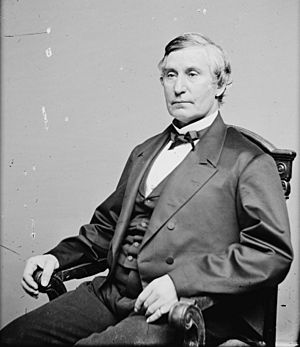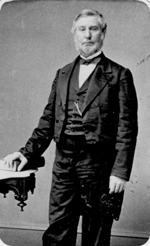Jacob M. Howard facts for kids
Quick facts for kids
Jacob M. Howard
|
|
|---|---|
 |
|
| United States Senator from Michigan |
|
| In office January 17, 1862 – March 3, 1871 |
|
| Preceded by | Kinsley S. Bingham |
| Succeeded by | Thomas W. Ferry |
| Attorney General of Michigan | |
| In office 1855–1860 |
|
| Governor | Kinsley S. Bingham Moses Wisner |
| Preceded by | William Hale |
| Succeeded by | Charles Upson |
| Member of the U.S. House of Representatives from Michigan's at-large district |
|
| In office March 4, 1841 – March 3, 1843 |
|
| Preceded by | Isaac E. Crary |
| Succeeded by | Robert McClelland |
| Member of the Michigan House of Representatives | |
| In office 1838 |
|
| Personal details | |
| Born |
Jacob Merritt Howard
July 10, 1805 Shaftsbury, Vermont |
| Died | April 2, 1871 (aged 65) Detroit, Michigan |
| Resting place | Elmwood Cemetery, Detroit, Michigan |
| Political party | Whig (before 1854) Republican (after 1854) |
| Spouse | Catherine Amelia Shaw (1810–1866) (m. 1835–1866) |
| Children | 7 |
| Education | Williams College |
| Profession | Attorney |
Jacob Merritt Howard (born July 10, 1805 – died April 2, 1871) was an American lawyer and politician. He is best known for serving as a U.S. Representative and U.S. Senator for Michigan. His political career happened during the American Civil War.
Howard was born in Shaftsbury, Vermont. He went to schools in Vermont and then graduated from Williams College in 1830. After studying law, he moved to Detroit in 1832 and became a lawyer in 1833. Howard worked as a lawyer in Detroit and became active in politics. He started with the Whig Party and later joined the Republican Party. He held several important jobs, including city attorney in 1834 and a member of the Michigan House of Representatives in 1838. In 1840, he was elected to the U.S. House of Representatives and served one term, from 1841 to 1843.
In 1854, Jacob Howard was one of the people who helped start the Republican Party. He then served as Michigan Attorney General from 1855 to 1861. After Senator Kinsley S. Bingham passed away in 1861, Howard was chosen to take his place. He started his term in January 1862. He was re-elected for a full term in 1865 and served until March 1871. From 1863 to 1871, Howard was the leader of the Senate's Committee on Pacific Railroads. Howard died on April 2, 1871, shortly after his last Senate term ended. He was buried in Elmwood Cemetery in Detroit.
Contents
Early Life and Education
Jacob Howard was born in Shaftsbury, Vermont, on July 10, 1805. His parents were Otis Howard, a farmer, and Mary "Polly" Millington. He went to local schools and academies in Bennington and Brattleboro. Howard graduated from Williams College in 1830. He was also a member of Phi Beta Kappa, an honor society. After college, he studied law with lawyer Homer Bartlett in Ware, Massachusetts. In 1832, he moved to Detroit, Michigan. He finished his law studies there and became a lawyer in 1833. He then started his law practice in Detroit.
Starting His Career in Politics
Howard became the city attorney for Detroit in 1834. He also joined a group of volunteers that Governor Stevens T. Mason put together for the Toledo War in 1835–1836. In 1838, Howard became a member of the Michigan House of Representatives.
He was elected as a Whig to the U.S. House of Representatives for the 27th Congress. He served from March 4, 1841, to March 3, 1843. He chose not to run for re-election in 1842 and went back to practicing law in Detroit. Howard became known for being against slavery within the Whig Party. He supported presidential candidates like Henry Clay (1844), Zachary Taylor (1848), and Winfield Scott (1852).
After the 1852 election, Howard felt that the Whig Party was no longer strong enough to fight against slavery. So, he helped create the ideas for the first Republican Party meeting. This meeting took place in Jackson, Michigan, in 1854. Many sources say that Howard was the one who chose the name "Republican" for the new party. Howard was the first Republican candidate for Michigan Attorney General. He won the election and served from 1855 to 1861.
Howard was a very well-read person. He knew a lot about classic books, history, law, and literature. He even translated the memoirs of Empress Joséphine from French and published them.
Serving as a U.S. Senator
In 1861, Howard was elected as a Republican to the U.S. Senate. He filled the spot left empty by the death of Kinsley S. Bingham. In November 1861, Abraham Lincoln offered him the job of Minister to Honduras. However, Howard turned it down so he could continue serving in the Senate. He was re-elected in 1865 and served from January 1862 to March 1871.
From 1863 to 1871, Howard was the chairman of the Committee on Pacific Railroads. He was also an active member of other important committees. These included the Judiciary, Military Affairs, and Private Land Claims Committees.
The False Claims Act
As a Senator, Howard was the main supporter of the False Claims Act, also known as the "Lincoln Law." This law allowed whistleblowers (people who report wrongdoing) to sue government contractors for fraud. Whistleblowers could receive a money reward based on what the government recovered. Howard believed that offering rewards to whistleblowers, even if they had done some wrong things themselves, was the best way to catch dishonest people. He famously said, "I have based the [qui tam provision] upon the old-fashioned idea of holding out a temptation, and 'setting a rogue to catch a rogue,' which is the safest and most expeditious way I have ever discovered of bringing rogues to justice."
Key Amendments to the Constitution
Howard worked closely with Abraham Lincoln to write and pass the Thirteenth Amendment. This important amendment officially ended slavery in the United States. In the Senate, he also served on the Joint Committee on Reconstruction. This committee helped write the Fourteenth Amendment.
As a Senator, Howard disagreed with President Andrew Johnson's plans for Reconstruction (rebuilding the country after the Civil War). Howard believed that Congress should have the main role in this process. He wrote the final report about President Johnson's decision to remove Edwin M. Stanton as Secretary of War. This report led to Johnson's impeachment.
Defining Citizenship: The 14th Amendment
During the discussions about the first part of the Fourteenth Amendment, Howard strongly supported including the phrase "and subject to the jurisdiction thereof." This phrase was important for defining who would be a citizen. He explained that this meant almost everyone born in the United States would be a citizen. This would not include children of foreign ambassadors, for example.
Howard also clarified that this part of the amendment had the same goal as the earlier Civil Rights Act of 1866. That act stated that "all persons born in the United States and not subject to any foreign power, excluding Indians not taxed, are hereby declared to be citizens of the United States." He mentioned that Native Americans who maintained their tribal ties would not automatically become citizens at that time.
Many other senators agreed with Howard's view on citizenship. Senator Reverdy Johnson said that the amendment aimed to clearly define citizenship based on birth within the United States.
Death and Burial
Jacob Howard passed away in Detroit on April 2, 1871. This was shortly after his last term as a Senator ended. Reports say that he overdid it while helping to cut down a tree. This caused a blood vessel in his brain to burst, and he died two days later. He was buried at Elmwood Cemetery in Detroit.
Family Life
In 1835, Jacob Howard married Catherine Amelia Shaw (1810–1866) from Ware, Massachusetts. They had seven children together.
Honors and Recognition
In 1866, Williams College gave Howard an honorary degree called LL.D.. In 1954, a special historical marker was placed on the lawn of the Baptist church in Shaftsbury. This marker remembers Howard's important career. The church building later became the home of the Shaftsbury Historical Society.


